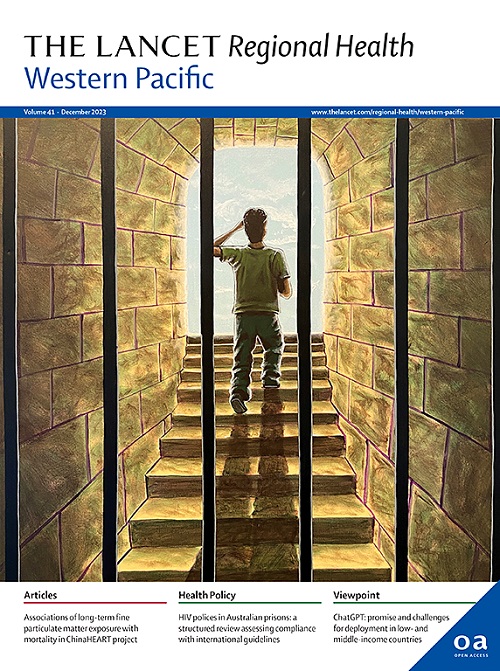基于人群的产前护理远程保健成本最小化分析
IF 7.6
1区 医学
Q1 HEALTH CARE SCIENCES & SERVICES
引用次数: 0
摘要
背景为应对 COVID-19 大流行,维多利亚州最大的产科服务提供商针对高危和低危孕妇实施了远程医疗综合产前护理 (ANC) 计划。该计划自 2020 年 3 月起一直在实施。该研究旨在从医院和患者的角度,对远程医疗综合产前护理与传统的面对面产前护理进行成本最小化分析。我们假设远程医疗综合产前护理的相关成本将低于面对面产前护理。我们从 2018 年 1 月 1 日至 2020 年 3 月 22 日(远程保健前)和 2020 年 4 月 20 日至 2021 年 12 月 31 日(远程保健后)在蒙纳什卫生院接受产前护理和分娩的单胎妊娠妇女中生成了倾向得分匹配的远程保健前和远程保健后队列。数据提取自电子医疗和财务记录。我们分配了莫纳什卫生院所有门诊、住院和急诊的费用,以计算每次分娩的平均成本。根据居住地与医院的距离估算出患者的交通费用。死胎、先兆子痫、严重孕产妇发病率或死亡人数无明显差异。在远程保健后队列中,每次分娩的成本增加了 133 澳元(0.98%,95% CI [-0.17%, 2.16%])。这主要是由于产前住院次数增加了 4.78%,门诊预约次数增加了 3.51%,从而导致住院费用增加(340 澳元或增加 2.64%,[1.44%, 3.86%])。随着妊娠糖尿病、剖腹产和专科护理率的增加,远程保健后的护理复杂性也有所增加(p 值均为 0.0001)。相比之下,患者获得医疗服务的成本从远程保健前的 562 澳元大幅降至远程保健后的 355 澳元(差异为 -207 澳元(-36.81%,[-37.46%,-36.16%])。这一研究结果为远程医疗产前护理的经济可行性提供了保证。本文章由计算机程序翻译,如有差异,请以英文原文为准。
A cost-minimisation population-based analysis of telehealth-integrated antenatal care
Background
In response to the COVID-19 pandemic, Victoria’s largest maternity service provider implemented a telehealth-integrated antenatal care (ANC) schedule for high- and low-risk pregnancies. The program has been maintained since March 2020. Given ever-increasing healthcare costs, economic evaluation is crucial to ensure value and guide ongoing use.
Methods
The aim of the study was to perform a cost-minimisation analysis of telehealth integrated ANC compared to conventional in-person ANC, from the hospital and patient perspectives. We hypothesised that the costs associated with telehealth integrated ANC would be less than in-person ANC. We generated propensity score matched pre- and post-telehealth cohorts from women with a singleton pregnancy who received ANC and birthed at Monash Health from 1 Jan 2018–22 Mar 2020 (pre-telehealth), and 20 Apr 2020–31 Dec 2021 (post-telehealth). Data were extracted from electronic medical and finance records. We assigned costs for all Monash Health outpatient, inpatient, and emergency department episodes to calculate mean cost per birth. Patient travel costs were estimated based on distance residing from hospital.
Findings
Matched pre- and post-telehealth cohorts of n = 13,534 each were created. There were no significant differences in stillbirth, pre-eclampsia, severe maternal morbidity, or death. There was a AU$133 (0.98%, 95% CI [−0.17%, 2.16%]) increase in cost per birth in the post-telehealth cohort. This was driven by increased hospital costs (AU$340 or 2.64% increase, [1.44%, 3.86%]), due to a 4.78% increase in antenatal inpatient episodes and 3.51% increase in outpatient appointments post-telehealth. Increased care complexity was noted in the post-telehealth period with increased rates of gestational diabetes, caesarean birth, and specialty-led care (p-values all <0.0001). In contrast, patient costs of accessing healthcare fell significantly from AU$562 pre-telehealth to AU$355 post-telehealth (difference -AU$207 (−36.81%, [−37.46%, −36.16%]).
Interpretation
Telehealth supported the provision of a greater volume of antenatal care to more complex pregnancies, while maintaining safety and quality of care, for only a minimal cost increase to health funders and substantial cost savings to patients. This finding provides reassurance regarding the financial viability of telehealth-integrated antenatal care.
Funding
None.
求助全文
通过发布文献求助,成功后即可免费获取论文全文。
去求助
来源期刊

The Lancet Regional Health: Western Pacific
Medicine-Pediatrics, Perinatology and Child Health
CiteScore
8.80
自引率
2.80%
发文量
305
审稿时长
11 weeks
期刊介绍:
The Lancet Regional Health – Western Pacific, a gold open access journal, is an integral part of The Lancet's global initiative advocating for healthcare quality and access worldwide. It aims to advance clinical practice and health policy in the Western Pacific region, contributing to enhanced health outcomes. The journal publishes high-quality original research shedding light on clinical practice and health policy in the region. It also includes reviews, commentaries, and opinion pieces covering diverse regional health topics, such as infectious diseases, non-communicable diseases, child and adolescent health, maternal and reproductive health, aging health, mental health, the health workforce and systems, and health policy.
 求助内容:
求助内容: 应助结果提醒方式:
应助结果提醒方式:


